Posted May 15, 2018 by Nicky in Reviews / 2 Comments
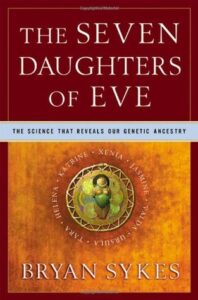 Seven Daughters of Eve, Bryan Sykes
Seven Daughters of Eve, Bryan Sykes
It’s been a while since this book was published, of course, and the science of investigating ancient mitochondrial DNA has been going from strength to strength, but this is still a good book on the background of that research, the importance of mitochondrial DNA, and the idea that we can trace our lineage back through the female line to just a few specific women. (Actually, this is very Europe-centric, a fact that becomes clear when you read the whole book: the seven ‘clan mothers’ mentioned are only the last common ancestors of European mitochondrial lines.)
Sykes writes clearly and well, and the only bit I wasn’t happy with as popular science writing is the little fake histories of the seven women. He tries to put flesh on the bones of what the women might have been like, the environment and social situations they would have encountered, but it’s really far too much like pure fiction for me. If he’d even included some more perhapses and maybes and alternative scenarios, I might have been more comfortable with it. As it is, it gives us a false idea that there were seven such knowable women.
Still, it’s fascinating stuff and I do love reading about this kind of genetic detective work.
Rating: 4/5
Tags: book reviews, books, non-fiction, science
Posted May 13, 2018 by Nicky in Reviews / 0 Comments
 Universal, Brian Cox, Jeff Forshaw
Universal, Brian Cox, Jeff Forshaw
This is really clearly written, it covers fascinating subjects, and the authors have tried really hard to equip readers with the ability to think things through for themselves. They don’t just state conclusions: they lead the reader through how those conclusions were reached, until they are also inevitable for the reader. It’s a smart way to write, although the right people — the people who look at the conclusions and decide they’re wrong without any evidence — probably won’t actually go through the evidence.
Unfortunately, a lot of this evidence involves thinking mathematically, which is not a strong point for me. I can hammer something into my head for practical purposes (I can now do a bunch of statistical tests using paper and a calculator!) and I can remember how to calculate something I find interesting (the number of base pairs in a fragment of DNA from how far it travelled during gel electrophoresis), but I’m not good with big concepts. And Cox and Forshaw tackle some of the biggest here.
At another time, I might be in the mood to work through this more thoroughly. As it is, I didn’t finish it — not because I think it’s bad (it’s not), but just because this is not the time. Too much for me to learn that’s more immediately relevant.
(Remember that my ratings denote enjoyment, not usefulness or interestingness per se. It’s just… maths. Not for me, not right now.)
Rating: 2/5
Tags: book reviews, books, non-fiction, science
Posted April 26, 2018 by Nicky in Reviews / 0 Comments
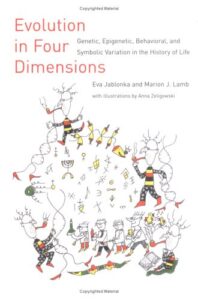 Evolution in Four Dimensions, Eva Jablonka, Marion J. Lamb
Evolution in Four Dimensions, Eva Jablonka, Marion J. Lamb
This is really clear if you know a bit about what it’s talking about, and probably impossibly dense if you don’t. The illustrations are rather whimsical usually, rather than being useful (even for people who aren’t me and can make sense of things they’re looking at!), and there are “dialogues” at the end of each chapter which go over the previous points and basically play a bit of Devil’s advocate. They didn’t work for me because it was so artificial — obviously they wrote the dialogues entirely themselves, so it was just the questions they wanted to answer — but it might be helpful in clarifying some things for some readers.
There’s some new stuff since this revised edition came out, but it’s still a good primer on epigenetics and some of the other things that are significant when you discuss evolution (like culture). I probably wouldn’t recommend it to a layperson, but if you’re already interested, it’s a good one.
Rating: 4/5
Tags: book reviews, books, non-fiction, science
Posted April 22, 2018 by Nicky in Reviews / 0 Comments
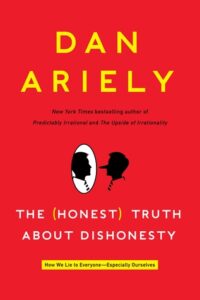 The (Honest) Truth About Dishonesty, Dan Ariely
The (Honest) Truth About Dishonesty, Dan Ariely
The reasons why we lie and to what extent we’re willing to lie are pretty fascinating, and if you haven’t read anything else of the sort before, this might be pretty revelatory. Ariely explains the various studies and results pretty clearly, and it’s definitely not aimed at people who have actually dug into the academic publications: it’s accessible to a layperson, definitely, and to my mind pretty much aimed at the layperson. At any rate, I didn’t find any of it surprising, because I’ve read most of this before and know something of the way we’ve discovered our brains work. I’m not 100% positive there was nothing new, but there wasn’t much that didn’t sound familiar.
So, a good read if you’re looking for something on the subject, but probably not much point if you’re already pretty aware of research into dishonesty and why we lie.
Rating: 3/5
Tags: book reviews, books, non-fiction, science
Posted April 19, 2018 by Nicky in Reviews / 0 Comments
 The Golden Age of Murder, Martin Edwards
The Golden Age of Murder, Martin Edwards
There’s a lot going on in this novel — it tracks the development of crime fiction and mystery stories, deals with the biographies of various famous Golden Age crime writers (including Agatha Christie, Dorothy L. Sayers and Anthony Berkeley, of course) and deals with the development of the Detection Club. There’s a lot of stuff I didn’t know, even about Sayers (whose work I adore), and the whole thing left me feeling that my experience of the Golden Age of crime fiction was rather limited. Fortunately, and not coincidentally, Martin Edwards has also been curating the publication of the British Library Crime Classics, so I’ve been able to check out some of the authors that were totally unfamiliar to me (and I have a whole stack more to get to, too).
It’s an enjoyable read, though it does get a little bogged down or distracted at times — I think because it does try to tackle so much. It doesn’t stick purely to a single writer, but nor does it stay firmly focused on the Detection Club as a whole. If you’re interested in the period, though, it’s a gem.
Rating: 4/5
Tags: book reviews, books, non-fiction
Posted April 12, 2018 by Nicky in Reviews / 1 Comment
 Daphne du Maurier, Margaret Forster
Daphne du Maurier, Margaret Forster
This is overall a well done and exhaustive biography, pulling out a lot of interesting factors, events and people in Daphne du Maurier’s life and relating them to her work. If you’re interested in Daphne du Maurier it’s definitely worth a read — I’m not a super fan, personally, though I’ve read a couple of her books, and I found it pretty interesting and found myself really wanting to reread her books with some of this in mind (especially Rebecca and My Cousin Rachel).
I didn’t end up actually finishing the book, but that’s a pretty personal thing — Daphne du Maurier is described as being a pretty private person, and hating the very idea of being thought to be a lesbian, and yet this is so frank about her affairs with women. I found it felt too much like prying for me.
Rating: 3/5
Tags: book reviews, books, non-fiction
Posted April 6, 2018 by Nicky in Reviews / 4 Comments
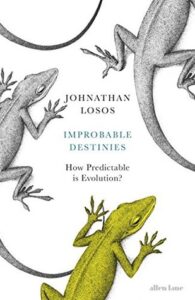 Improbable Destinies, Jonathan Losos
Improbable Destinies, Jonathan Losos
The question Losos asks, and tries to answer, is this: can we predict evolution? Are certain things inevitable in development — birds, humans, antibiotic resistance, etc, etc? He writes engagingly about field work, experiments, thought experiments, the various theories and people who have supported them… I definitely want to do more reading on this.
Am I convinced? Well, I’m not sure Losos is convinced that evolution can be predicted in detail; he presents some good evidence that suggests that you can predict the sorts of changes in gene function that will be beneficial in a certain environment, but that you can’t predict exactly how those changes will come about. Sometimes one gene might be altered, sometimes another. The phenotype is predictable (unsurprisingly: look for what would benefit the species in breeding successfully) but the genotype is not, unless it’s a fairly simple case of one particular molecular switch needing to be flipped on or off. There is a great deal of contingency in the process of evolution: Gould was (at least to some extent) correct in suggesting that we can’t “rewind the tape of life” and then see things proceed in exactly the same way.
As with determinism in any sense, I generally believe that if all factors were known, we would also know the result. I’m just not sure we can know those factors (and I dislike and squirm away from applying it to human ethics — our actions may be caused by previous events, but we don’t experience the process that way, so it’s irrelevant in how to be moral) — especially given events on a quantum level.
Rating: /5
Tags: book reviews, books, non-fiction, science
Posted April 5, 2018 by Nicky in Reviews / 0 Comments
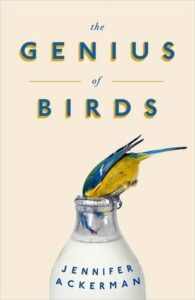 The Genius of Birds, Jennifer Ackerman
The Genius of Birds, Jennifer Ackerman
If you’ve read much about animal intelligence, most of the stuff in this book won’t be all that surprising, though of course since it’s entirely about birds, it includes a lot more anecdotes and bird-focused studies. As a whole, the book definitely makes a case for birds as specialised, well adapted, and very intelligent in their own spheres. We won’t be having philosophical discussions with them any time soon, though, if that’s what you thought ‘genius’ meant. And I think honestly that Ackerman makes less of a case for bower birds’ displays being art than others I’ve read.
It’s an easy read, and good for some ‘huh, cool’ moments, but not the most rigorous or unmissable popular science book out there.
Rating: 3/5
Tags: book reviews, books, non-fiction, science
Posted March 29, 2018 by Nicky in Reviews / 3 Comments
 Built on Bones, Brenna Hassett
Built on Bones, Brenna Hassett
This is one of the Bloomsbury Sigma titles, so it’s fairly light-hearted, accessibly written, and not too heavy on the scientific footnotes (though there’s a lot of joking ones), but trustworthy enough that I found it fascinating. Hassett discusses mostly bioarchaeology and what it has to say about that great human endeavour: city life. A lot of people are very critical about city living and its suitability for humanity, but Hassett’s mostly pretty positive about it (after the initial transition period, at least).
And surprise! There’s also a lot about disease, making it super relevant to me in my interest in zoonotic diseases especially. A whole section on leprosy and TB! It’s like it was written for me.
A fun and informative read, definitely good popular science/archaeology, if that interests you.
Rating: 4/5
Tags: book reviews, books, non-fiction
Posted March 27, 2018 by Nicky in Reviews / 0 Comments
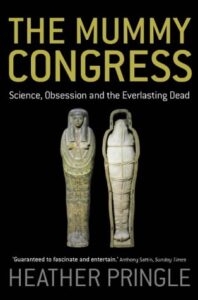 The Mummy Congress, Heather Pringle
The Mummy Congress, Heather Pringle
Mummies are always fascinating to me, at least in non-fiction, and this book was especially so because it covers a lot of ground, from Inca child sacrifices to Stalin to ancient bog bodies. It’s the kind of book I love, with something new (but related) in each chapter, introducing new sites and concepts I wasn’t aware of without going into any one thing exhaustively. I found myself googling for images to match the text.
The only thing I would really criticise is the hyperbolic breathlessness about how some of these mummies “look as if they were alive” or “wouldn’t look out of place on the street”. No, the preservation is amazing, but I have yet to see a mummy that is truly so immaculately preserved that it wouldn’t stick out like a sore thumb trying to walk around the streets. The faces are sunken, the jaws and teeth and cheekbones too prominent, etc, etc. They’re obviously dead. I find I have more respect for them while recognising that they’re dead than trying to pretend that they look just as they did when alive. They don’t.
There’s an amazing amount to be learned from some of these bodies, and Pringle does a great job of showing some of the breadth of what’s out there and what questions we need to ask.
Rating: 4/5
Tags: book reviews, books, history, non-fiction
 Seven Daughters of Eve, Bryan Sykes
Seven Daughters of Eve, Bryan Sykes








